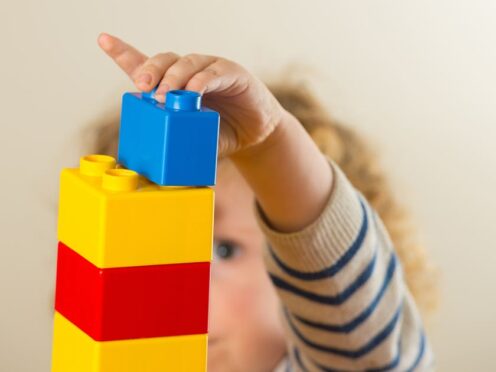Half of parents do not think toilet training is solely their responsibility, a survey suggests.
Teachers are having to spend 2.5 hours of their day, on average, helping children who are not developmentally ready for Reception, according to a report by early years charity Kindred2.
More than 1,000 staff in primary schools and 1,000 parents of Reception age children in England and Wales were surveyed by Savanta for Kindred2.
The online poll of school staff, carried out in October and November 2023, suggests that 50% of them believe issues with school readiness are worse than in September 2022.
School staff reported that 39% of children in Reception struggle to hold a pencil, 37% are unable to dress independently, 25% do not have basic language skills and 24% are not toilet trained.
Primary school staff also reported that 28% of children in Reception “incorrectly use books” – for example, they swipe or tap them as if using an electronic device.
One teacher said: “I feel like we’re not teaching as much in the first year now as we used to – it’s more babysitting… teaching them basic skills…It’s like being the parent for them. You know, what they should have done at home.”
The study found that parents and teachers hold different views on school readiness – with 91% of parents reporting that their child was ready for school when they entered Reception.
The online survey of parents, carried out in October 2023, suggests that 50% of parents think some of the responsibility for toilet training lies elsewhere – including with schools.
More than two in three (69%) of school staff think parents need more guidance about what is expected of children at this age.
The report found that parents and teachers agree that there are a number of factors that are contributing to the lack of school readiness – including screen time and cost-of-living pressures.
Felicity Gillespie, director of Kindred2, said: “The shocking findings in this year’s report should be a watershed moment for schools and parents because we know that children who are behind before they begin Reception are more likely to struggle throughout life.”
She added: “If teachers are still having to spend on average 2.5 hours of their day helping children who are developmentally behind before they begin their school-based education, every child misses out.
“Better, earlier information and a national conversation about whose job it really is to get children off to the best start is needed now.”
Geoff Barton, general secretary of the Association of School and College Leaders (ASCL), said: “It’s concerning that more children appear to be starting primary school without the basic life skills they need.
“Early years education plays a crucial role in children’s development and has a real bearing on their readiness to start school. It’s therefore vital that all children have the opportunity to access high-quality education from a young age.
“As this survey states, the rising cost of living is not conducive to this aim. Where families are only able to access limited free childcare, children are more likely to miss out on vital early years learning.
“There needs to be investment in early years education to ensure the sector has the capacity to provide all children with the best possible start to their education, and that families have the support they need to access these settings.”
A Department for Education (DfE) spokesperson said: “We recognise that children’s early years are crucial – which is why we are providing a package of training, qualifications and expert guidance for early years workers, which includes support for them to improve children’s speech, language and communication skills.
“Parents can also access support to help with their child’s development via the Government’s Family Hubs and Start for Life programme. This is part of our £300 million investment to transform services for parents, carers, babies and children in 75 local authority areas across England.”
